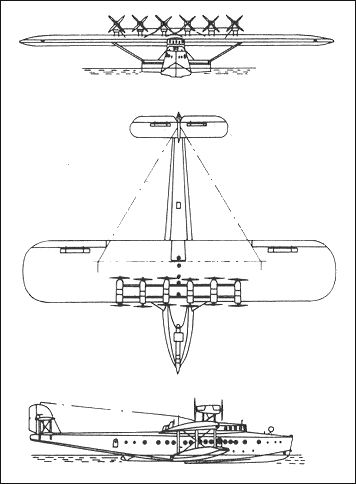|
| The Do X was built in Switzerland by Aktiengesellschaft fur Dornier-Flugzeuge at Altenrhein and first flew on 25 July 1929. It was then by far the largest flying-boat in the world and remained so until World War II: on 21 October 1929 it lifted 150 passengers, a crew of 10 and 9 stowaways. But engine troubles caused considerable problems and the original 12 Siemens-built Bristol Jupiter radials were replaced by 12 Curtiss Conquerors.
Its most notable flight was from Friedrichshafen to New York: beginning on 2 November 1930 and ending on 27 August 1931, it flew via Amsterdam, Galshot (England), Lisbon (where fire damaged a wing), Canary Islands (where the hull was damaged), Bolama (Portuguese Guinea), Cape Verde Islands, Fernando Noronha, Natal (Brazil), Rio de Janeiro and the West Indies.
Two sister ships, the Umberto Maddalena and Alessandro Guidoni, were also built for Italy. FACTS AND FIGURES © The three decks included
a lounge, smoking room,
bathroom, kitchen and
dining room as well as
individual sleeping cabins. © Fuel consumption was
1818 litres
per hour. Returning from
South America, the Do X
had to land on the water
and taxi the last 10km to Portugal. © Fully loaded, the
maximum speed was only
160km/h. © The initial Siemens-built
Bristol Jupiter engines
proved inadequate, so
Curtiss Conquerors were
substituted. In all cases the
rear-facing engines tended to
overheat.
| CREW | 10 |
| PASSENGERS | 72 |
| ENGINE | 12 x Curtiss "Conqueror", 440kW |
| WEIGHTS |
| Take-off weight | 48000 kg | 105822 lb |
| Empty weight | 28250 kg | 62281 lb |
| DIMENSIONS |
| Wingspan | 48.0 m | 158 ft 6 in |
| Length | 40.1 m | 132 ft 7 in |
| Height | 10.1 m | 33 ft 2 in |
| Wing area | 450.0 m2 | 4843.76 sq ft |
| PERFORMANCE |
| Max. speed | 200 km/h | 124 mph |
| Cruise speed | 175 km/h | 109 mph |
| Ceiling | 420 m | 1400 ft |
| Range w/max.fuel | 3600 km | 2237 miles |
| Range w/max payload | 1100 km | 684 miles |
| werner, e-mail, 21.10.2015 07:08 When I was 3 years old, my Mom and Dad visited the DOX- D-1929 at North Beach Seaplane base. I still have the photo my Dad took of Mom and me. reply | | Werner, e-mail, 05.10.2015 02:26 Three Do Xs were constructed in total: the original (DO X1 - registered D-1929) operated by Dornier, and two other machines based on orders from Italy – the X2, named Umberto Maddalena (registered I-REDI), and X3, named Alessandro Guidoni (registered I-ABBN). Germany's original Do X was turned over to Deutsche Luft Hansa, the national airline at that time, after the financially strapped Dornier Company could no longer operate it. After a successful 1932 tour of German coastal cities, Luft Hansa planned a Do X flight to Vienna, Budapest, and Istanbul for 1933. The voyage ended after nine days when the flying boat's tail section tore off during a botched, over-steep landing on a reservoir lake near the city of Passau. While the fiasco was successfully covered up, the Do X was out of service for three years, during which time it changed hands several times before reappearing in 1936 in Berlin. ("On 5 September 1933 the DO-X was flown back to the Bodensee (Lake Constance). The Passau fiasco started the DO-X's trip to the museum.") The Do X then became the centerpiece of Germany's new aviation museum Deutsche Luftfahrt-Sammlung at Lehrter Bahnhof.
The Do X remained an exhibit until it was destroyed in an RAF air raid during World War II on the night of 23–24 November 1943. Fragments of the torn-off tail section are on display at the Dornier Museum in Friedrichshafen. While never a commercial success, the Dornier Do X was the largest heavier-than-air aircraft of its time, a pioneer in demonstrating the potential of an international passenger air service. A successor, the Do-XX, was envisioned by Dornier, but never advanced beyond the design study stage.
The Italian variants were essentially identical to the original with the exception of being slightly larger and using a different powerplant and engine mounts.[10] Dornier claimed the X2 was the largest aircraft in the world at that time. Each was powered by Fiat A-22R V12 water-cooled engines, with the six engine mounts being covered by a streamlined fairing. The Do X2 entered service in August 1931, and the X3 followed in May, 1932. Both were initially based at the seaplane station at La Spezia, on the Ligurian Sea, and reassigned to various other bases during their service.After plans for a first-class passenger service (Genoa-Gibraltar) were deemed unfeasible, the X2 and X3 were used for officer training cruises, aeronaval maneuvers, and publicity flights. After scaling back flights and crew complements during 1934, they were mothballed at Marina di Pisa in 1935, and broken up for scrap in 1937. reply | | art, e-mail, 06.05.2015 19:22 Yes I like to build one as a wind yain but need more spec. I use 1in to three ft as a scale reply | | Cecil R Murphy, e-mail, 05.10.2011 05:31 If my memory sewves me correct that aiecraft flew north over Core Sound , the coast of North Carolina on its way from Brazil to New york. I remember hearing the noise long before I saw the aircraft. As we did not get a news paper nor had a radio, I am sure no one in my small comunity of Davisknew any thing about the flight. I do remember it to this day
Cecil R Murphy
103 Cannery
Morehead City NC 28557 reply | |
| | RUDI, e-mail, 12.08.2011 01:15 SAW THE REMNANTS IN THE BOMBED MUSEUM FOR AVIATION OR TRANSPORT IN BERLIN NOT FOR FROM THE LEHRTER BAHNHOF UNDER THE COLLAPSED ROOF OF THE MUSEUM IN THE FALL OF 1945 OR SPRING 1946.
I MANAGED TO CLIMB ON THE RIGHT STUB WING , IT WAS A GREAT MOMENT FOR A 14 YEAR OLD APPRENTICE ON AN ERRANT, STUMBLING ACROSS THE DO X ,WHILE ONLY LOOKING FOR A PLACE TO RELIEF HIMSELF reply | | walter becker, e-mail, 25.07.2011 05:47 In 1931,when I was 6 years old, DOX was at North Beach Airport (predessessor of LaGuardia Airport). For a fee, you could go aboard. My father took me on it, and the main memory is of the size and luxury. reply | | George Tietjen, e-mail, 30.11.2010 20:19 The Do-X regularly woke me up during nap-time after lunch;
she used to fly over our house (Herzberger Strasse Bremen)
regularly; I believe it was then stationed on a lake nearby
(Lake Zwischenahn near Oldenburg) when not on tour.
What noise! reply | | Barry, 24.11.2009 14:43 The Italian types used Fiat A22 engines. The plane was not a great success and the Italian military took them over equally without success and they were both probably scrapped in 1935. reply | | UMESH THACKER AHMEDABAD INDIA, e-mail, 12.06.2009 13:49 DORNIER ITSELF IS THE WORLD FAMOUS COMPANY HAS THE BENCHMARK AND MARVEL IN GERMAN ENGINEERING ESP. DURING HITLER'S REGIME.SO ALSO IS THE MESSERSCHMIDT. reply | | Tom, e-mail, 02.10.2008 22:18 Find the "History of Aviation," website.
www.eads.net /1024 /en /eads /history /airhist /1920_1929 /dornier_dox_1924.html. reply | | CJA, e-mail, 02.10.2008 20:46 I understand 3 were produced, though the only photos I come across are of the call D-1929. Did they all have the same call#? And can anyone lead me in the direction of the actual fates of all three? I think i heard that one was lost in a museum after air raids over Germany in WWII, as for the other two for Italy? Thanks tons reply | | Tom Drennan, e-mail, 01.10.2008 01:22 I can't find the exact elevation of Altenrhein, but I'm fairly sure it is very neatr 1,400 feet probably closer to 1,300' but maybe a bit higher. I wonder howthat got it to fly at that altitude Tom reply | | luiz carlos marangoni, e-mail, 05.09.2008 18:20 Simplesmente, uma jóia rara! reply | | pat elliott, sr., e-mail, 30.05.2008 22:35 The ceiling of 1,400' must be a misprint; however, it coincides with the 420 meters. Is this correct? reply |
|
Do you have any comments?
|
| 
COMPANY
PROFILE
All the World's Rotorcraft
|







